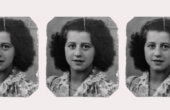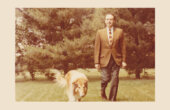Didier Eribon on James Baldwin, Fathers, and the Crushing Weight of the Past

When I reread James Baldwin’s beautiful text on the death of his father, one remark in particular struck me. Baldwin recounts that he put off a visit to the man he knew was very ill as long as he possibly could. Then he notes: “I had told my mother I did not want to see him because I hated him. But this was not true. It was only that I had hated him and I wanted to hold on to this hatred. I did not want to look on him as a ruin: it was not a ruin I had hated.”

Even more striking to me was the explanation he offers: “I imagine that one of the reasons people cling to their hates so stubbornly is because they sense, once hate is gone, that they will be forced to deal with pain.”
Pain, or rather, in my case — since the extinguishing of the hatred I had felt did not give rise to any pain in me — an urgent obligation to figure something out about myself, a pressing desire to track backwards in time in order to understand the reasons why it had been so difficult for me to engage in even the smallest of exchanges with this man, a man who, when it comes right down to it, I had barely even known. When I really think about it, I have to admit to myself that I know next to nothing about my father. What did he think about? Or about the world he lived in? About himself? About other people? How did he see things? The circumstance of his own life? In particular, how did he see our own relationship as it became more and more difficult, more and more distant, and finally non-existent?
I had a moment of stupefaction not too long ago when I learned that when he saw me on television one day, he broke down into tears, overcome by emotion. He was overwhelmed by the realization that one of his sons had achieved what seemed to him a nearly unimaginable degree of social success. And he was ready the next day, this man who had always been so homophobic, to brave the looks of his neighbors and anyone else in his village; he was even ready, should it be necessary, to defend what seemed to him to be his honor and the honor of his family. I had been speaking on television that night about my book, “Insult and the Making of the Gay Self,” and, concerned that such an appearance might provoke sarcastic remarks and comments, he declared to my mother: “If there’s any smartass who says anything to me about it, I’ll smash his face in.”
“As had been the case for Baldwin with his father, so I began to realize that everything my father had been … had been shaped by the violence of the social world.”
I never had a conversation with him, never! He wasn’t capable of it (at least with me, and me with him). It’s too late to spend time lamenting this. But there are plenty of questions I would now like to ask him, if only because it would help me write this book. Here again, I could only be astonished to discover these sentences in Baldwin’s account: “When he was dead I realized that I had hardly ever spoken to him. When he had been dead a long time I began to wish I had.” Then, describing his father’s past — his father had belonged to the first generation of free black men, his father’s mother having been born in the time of slavery —, he adds: “He claimed to be proud of his blackness but it had also been the cause of much humiliation and it had fixed bleak boundaries to his life.”
Under such circumstances, it seems nearly impossible for Baldwin not to have reproached himself now and then for having abandoned his family, for having betrayed his own kind. His mother never understood why he left, why he went to live so far away, first to Greenwich Village so he could be a part of the literary circles there, and then to France. Would it have been possible for him to stay? Obviously not. He had to leave, to leave Harlem behind, to leave behind his father’s narrow-mindedness, his sanctimonious hostility towards culture and literature, the suffocating atmosphere of the family home. How else could he become a writer, how else live openly his homosexuality (and take up in his work the double question of what it means to be black and to be gay)? Yet still the moment came where the necessity of a “going back” made itself felt, even if it was after the death of his father (in reality his stepfather, but still, the person who raised him from the earliest years of his childhood). The text that he writes to pay homage to this man might therefore be interpreted as his means of accomplishing, or at least of beginning, this mental “return,” the effort to understand who this person actually was, a man he had so detested and so wanted to get away from. Perhaps too, beginning this process of historical and political deliberation would allow him one day to reclaim his own past on an emotional level, to get to a place where he could not only understand, but also accept himself. It’s easy enough to see why, obsessed as he was by this question, he would insist so strongly in an interview that “to avoid the journey back is to avoid the Self, to avoid ‘life’.”
As had been the case for Baldwin with his father, so I began to realize that everything my father had been, which is to say everything I held against him, all the reasons I had detested him, had been shaped by the violence of the social world. My father had been proud to belong to the working class. Later on, he was proud to have risen, however modestly, above that condition. Yet his condition had been the cause of any number of humiliations and had set “bleak boundaries” to his life. It had planted a kind of madness in him that he never overcame and that made him nearly incapable of sustaining relationships with other people.
Like Baldwin in his quite different context, I am certain that my father bore within him the weight of a crushing history that could not help but produce serious psychic damage in those who lived through it. My father’s life, his personality, his subjectivity had been doubly marked and determined by a place and by a time whose particular hardships and constraints continually played off each other in a way that only made them proliferate. Here is the key to his being: where and when he was born, the timespan and the region of social space in which it was decided what his place in the world would be, his apprenticeship of the world, his relationship to the world. The near-madness of my father and the impaired relational abilities that resulted from it had, in the final analysis, nothing psychological about them, if by psychological we mean a link to some kind of individual character trait. They were the effect of the precisely situated being-in-the-world that was his.
Didier Eribon is a prominent French sociologist and author, internationally renowned for his biography of Michel Foucault and his groundbreaking memoir “Returning to Reims” (Semiotext(e)) from which this article is excerpted. His new book, “The Life, Old Age, and Death of a Working-Class Woman,” will be published by Semiotext(e) in March 2025.



